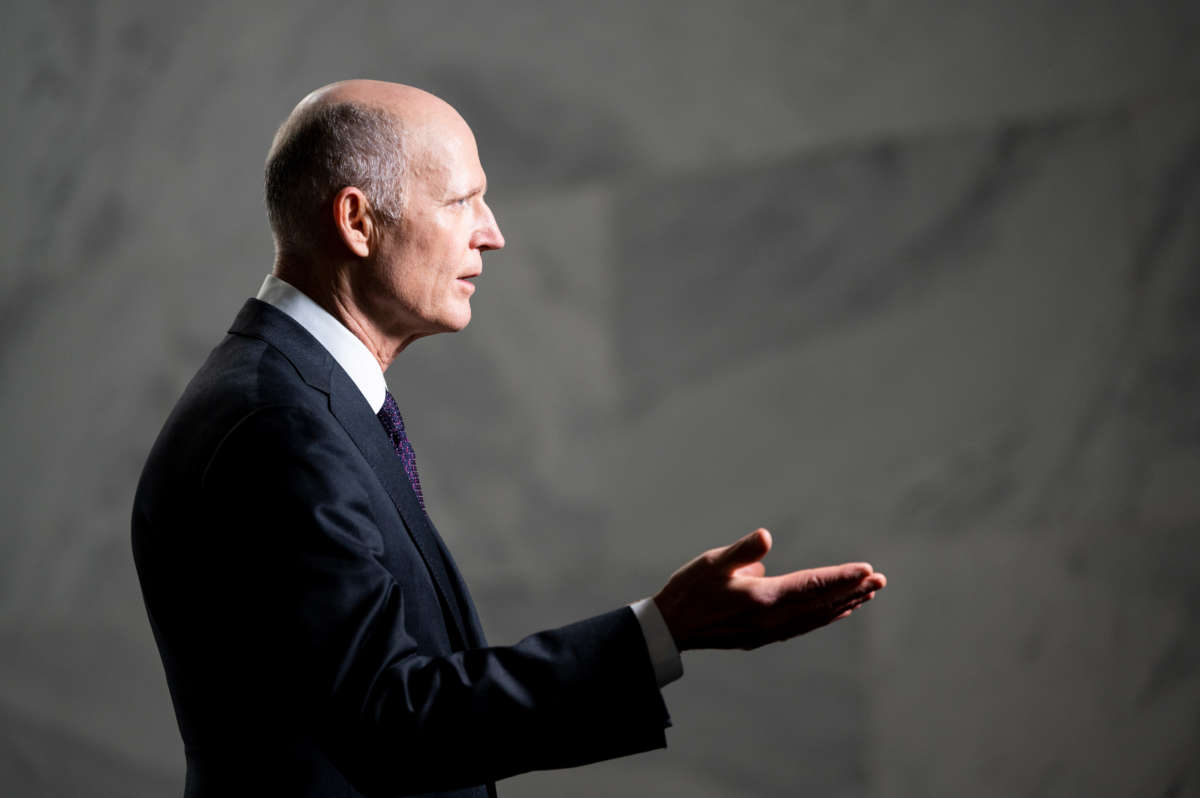Honest, paywall-free news is rare. Please support our boldly independent journalism with a donation of any size.
Sen. Rick Scott’s (R-Florida) plan to force every American to owe income tax in his recently released platform for the Republican Party would raise taxes by over $1,000 for the bottom 40 percent of income earners, a new analysis found.
In a report released on Monday, the Institute on Taxation and Economic Policy (ITEP) estimated that the poorest Americans would be the most affected by Scott’s plan — meaning that the GOP’s tax plan would essentially be to tax the poor.
The poorest 20 percent of Americans, who make $12,300 a year on average, would owe about $1,050 more in federal taxes, or about 9 percent of their income. The next 20 percent, who make $34,700 on average, would owe $1,390 more, or 4 percent of their income, ITEP found. The middle 20 percent of Americans would owe about $500 more on average. The top 5 percent would essentially owe $0 more.
Scott’s outline says that he wants to make sure all Americans pay some income tax in order “to have skin in the game.”
“Currently over half of Americans pay no income tax,” Scott wrote. Indeed, a large portion of Americans don’t owe federal income taxes. Many don’t owe taxes because they simply don’t make enough income to qualify. People with disabilities, retirees and other Social Security beneficiaries don’t owe taxes because much of the program is tax-exempt.
Some people don’t owe federal income taxes because they receive tax credits; because of programs like the Earned Income Tax Credit and the Child Tax Credit, many Americans have a negative tax burden.
ITEP calculated these estimates by assuming that Scott’s plan would make it so that all Americans owed at least $1 in taxes, taking credits into account. So, if a household had an income tax liability of $1,000, and would normally have received a credit of $1,500 from the Internal Revenue Service (IRS), they would not receive their expected $500 tax refund under Scott’s plan, ITEP wrote.
The poorest states would be most affected by this plan, the report found. Over 50 percent of Mississippi residents would see a tax increase, with other Southern states like West Virginia, Arkansas, Louisiana and Alabama trailing closely behind.
If Scott’s plan were passed, and carried out in the way that ITEP interpreted, it would have a devastating impact on the people in the country who are most in need.
According to the Federal Reserve, about 36 percent of Americans said in 2020 that they would have difficulty paying for an emergency expense of $400, with 12 percent saying that they wouldn’t be able to. This statistic is similar to that of previous years, despite the fact that COVID relief packages, extra unemployment insurance and expanded child tax credits helped lower financial worries for the public, even if they were laid off during the pandemic.
A recent survey showed that a large portion of Americans would have difficulty paying an emergency $1,000 bill. About 56 percent of survey respondents said that they would have to take steps like charging a credit card and paying it over time, cutting other expenses or borrowing the money in order to pay the bill.
Scott’s tax plan reflects Republicans’ stubborn opposition to raising taxes on the wealthy and corporations. Some of the world’s richest people, like Jeff Bezos and Elon Musk, regularly owe $0 or an otherwise miniscule amount in taxes. But GOP lawmakers have worked to maintain low tax rates for the richest Americans and slash funding for the IRS so that they can keep dodging taxes.
Press freedom is under attack
As Trump cracks down on political speech, independent media is increasingly necessary.
Truthout produces reporting you won’t see in the mainstream: journalism from the frontlines of global conflict, interviews with grassroots movement leaders, high-quality legal analysis and more.
Our work is possible thanks to reader support. Help Truthout catalyze change and social justice — make a tax-deductible monthly or one-time donation today.
